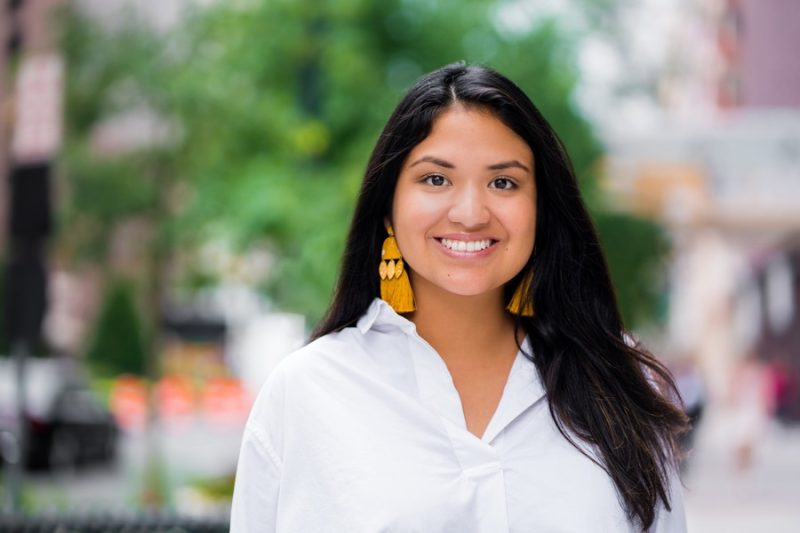PUBLISHED: 12th November 2025

by Kennedy Patlan
My twenties were defined by two things: navigating my BRCA1 mutation and getting acclimated to my new home in the DMV (DC-Maryland-Virginia). One informed the other, as navigating my cancer risk meant becoming extremely acclimated to the hospitals and care centers dispersed throughout DC and Northern Virginia.
Laying roots down in Northern Virginia has been so special and has shown me the value of state and local advocacy. Being a FORCE Patient Advocacy Leader and Research Advocate have been meaningful ways for me to practice patient advocacy in a localized context. Earlier this fall, my role as a volunteer at FORCE gave me the opportunity to attend the Virginia Cancer Conference, organized by the Cancer Action Coalition of Virginia.
All 50 states have a Cancer Plan, thanks to the CDC’s National Comprehensive Cancer Control Program. States are equipped with funding, guidance and technical assistance programs to develop and implement statewide plans to “prevent and control cancer.”
I left the conference with three key takeaways related to cancer prevention:
- The role of state advocacy: During a time when federal programs are in flux, state-level advocacy remains a lever to ensure access, affordability and equity-based policies are maintained for patients and communities. FORCE’s public policy efforts have helped to advance such legislation in Virginia, including:
- HB 1609, enacted into law in 2025, requires most VA health insurers to cover fertility preservation and IVF services.
- HB 2097/SB 1314 mandates most VA health insurers to cover high-risk prostate cancer screening with no patient cost-sharing.
- HB 1828/1436 requires most health insurers to cover high-risk (supplemental) breast cancer screening, such as MRIs, ultrasounds and diagnostic imaging, with no out-of-pocket costs for the patient.
- The role of community outreach: State-based advocacy can preserve crucial initiatives dedicated to addressing cancer prevention and care for communities. One key example is Virginia’s Every Woman’s Life program, which helps uninsured women throughout the state access free breast and cervical cancer screenings. This type of community outreach was another major trend throughout the conference, with community partners (e.g., social service non-profit organizations, educational institutions, county departments, faith-based centers) emerging as key partners in reaching often marginalized communities.
Virginia’s hospitals are also piloting approaches to expand access to cancer prevention screening, including Inova, my local hospital. I have had the pleasure of volunteering with the Inova Saville Mobile Screening Bus team to see their work in action. The team ensures that community members can receive free breast, gyn-onc and colon cancer screenings—cancers that may affect patients with genetic mutations. Working with partners including Nueva Vida (also a FORCE partner!), as well as local churches, mosques and other community spaces, the team meets communities to promote and provide free and safe screening options.
A final aspect of community outreach that was emphasized—at the conference and in my continuing work with the Mobile Screening Bus team—is the importance of acknowledging outside factors that may impact someone’s ability to access care. For instance, the Inova team offers free, day-long Screening Days on Saturdays, recognizing that many patients are unable to take off work or secure childcare during the week.
- The role of data: At the conference, the Virginia Cancer Screening Research Network emerged as an example of state efforts to organize Virginia’s clinical trial landscape. This leads me to my final takeaway, which may be the most challenging to address. Nate Silver, statistician and author, says it best: "The numbers have no way of speaking for themselves. We speak for them. We imbue them with meaning." This rings true in healthcare settings, as state health departments require community data that are reflective of the entire patient journey—from prevention to diagnosis to survivorship—to ensure that their cancer plans are on track to meet the expected progress, and to allocate funding and programs as needed. But underscoring all research is representation; a dataset is only as representative as the patients who comprise it. FORCE Research Advocates are at the frontlines of ensuring that patients across the hereditary cancer community are represented and included in cancer research that ultimately affects state-based planning and policy efforts.
My time as a neighbor, friend, loved one and patient in Virginia has shown me how state and local life is a microcosm of what can be achieved at a national scale. State-based change is incremental and may be perceived as small, but for residents and patients like me, it means everything.
Kennedy Patlan is a BRCA1 previvor based in the Northern Virginia area. She has spent the past 6+ years working with non-profits and foundations to support their strategic operations and communications efforts. Additionally, as a FORCE volunteer, Kennedy has supported the organization's peer, public policy and research advocacy efforts.